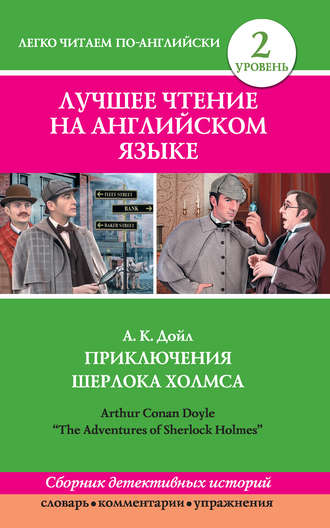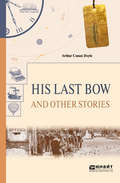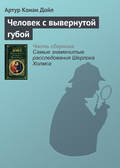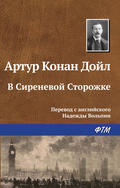
Артур Конан Дойл
Приключения Шерлока Холмса / The Adventures of Sherlock Holmes (сборник)
Exercises
1. Answer the questions:
1. What plans did Holmes make for the night?
2. How did Sherlock Holmes and Dr. Watson spend the evening?
3. What facts did Sherlock Holmes think were important in the case?
4. How did Sherlock Holmes and Dr. Watson get into Stoke Moran that night? Did anything unusual happen to them on the way there?
Think and say
1. Did Sherlock Holmes think that anything threatened Miss Stoner that night?
2. Why did Sherlock Holmes go to a hotel till night rather than hide in Stoke Moran?
2. Find the following words and phrases in the text and reproduce situations from the text with them. Give Russian equivalents.
1. to follow smb’s advice
2. in detail
3. evidence
4. to have (no) difficulty (in) doing smth
5. criminal n
3. Paraphrase the underlined parts of the sentences so as to use the phrases above.
1. It won’t be difficult for them to get tickets for the concert.
2. Mary told her mother about her exams giving a lot of facts.
3. The police are examining the room where the crime was committed. They are collecting everything that can show who committed it.
4. Michael did what his father told him and took a medical degree.
5. Everybody found it difficult to understand Hans because of his strong foreign accent.
6. Almost all those who break law hope that they will not be caught.
7. The engineer wrote instructions for the workers and explained every operation carefully.
8. Police officers are often called to court to give facts of the crime.
4. Complete the sentences with the words and phrases above in the correct form.
1. John… remembering people’s names.
2. The police are looking for a… who is hiding somewhere in the neighbourhood.
3. After the investigation was over Sherlock Holmes told Dr. Watson about it…
4. Sherlock Holmes thought that first he had to get… and only then could he come to some conclusion.
5. Medical… did not help to find the cause of death.
6. The girl said she had always… her father’s…, but this time she would decide for herself.
7. The teacher often… reading her students’ handwriting, so she asks them to type their works on the computer.
8. Mr. Simmons is tired of his wife telling him what she did during the day…
VII
My companion closed the window, moved the lamp onto the table, and looked round the room. All was as we had seen it in the daytime. Holmes whispered into my ear:
“Any sound can be fatal to our plans.”
I nodded to show that I had heard.
“We must sit without light. He will see it through the ventilator.”
I nodded again.
“Do not go asleep; your life may depend upon it. Have your revolver ready. I will sit on the side of the bed, and you in that chair.”
I took out my revolver and put it on the table.
Holmes had brought a long thin cane, which he put upon the bed beside him. He also put there a box of matches and a candle. Then he turned down the lamp, and we were left in darkness.
I shall never forget that awful night! I could not hear a sound, but I knew that my companion sat beside me, as nervous as I was myself. We waited in absolute darkness. How long seemed those hours! The clock of the village church struck twelve, and one and two and three, and still we sat waiting silently for we did not know what.
Suddenly there was light up in the opening of the ventilator. It was followed by a strong smell of burning oil and metal. Someone in the next room had lit a lamp. I heard somebody move there, and then all was silent again, though the smell grew stronger. For half an hour I sat listening. Then suddenly I heard another sound – a very low hissing sound. The moment we heard it, Holmes struck a match, and lashed with his cane at the bell-rope.
“You see it, Watson?” he shouted. “You see it?”
But I saw nothing. At the moment when Holmes struck the light I heard a low, clear whistle, but I could not see anything in the sudden light. I could, however, see that Holmes stopped striking and was looking up at the ventilator when suddenly there came the most horrible cry to which I have ever listened. It grew louder and louder, a horrible cry of pain and fear and anger. They say that that cry could be heard in the village.
“What can it mean?” I whispered.
“It means that it is all over,” Holmes answered. “And perhaps, after all, it is for the best. Take your revolver, and we will enter Dr. Roylott’s room.”
With a serious face he lit the lamp and went down the corridor. Twice he struck at the door of Dr. Roylott’s room without any answer. Then he entered, I followed him, with the revolver in my hand.
On the table stood a lamp, throwing light upon the safe, the door of which was ajar. Beside this table, on the chair, sat Dr. Grimesby Roylott. In his hand he had the long lash which we had seen during the day. Round his head he had a yellow speckled band. As we entered he did not move.
“The band! the speckled band!” whispered Holmes.
I took a step forward. In a moment the strange band began to move, among his hair we saw the head of a snake.
“It is the deadliest snake in India!” cried Holmes; “He died ten seconds after he was bitten. The schemer falls into the pit which he digs for another[28]. Let us put it back into the safe, and we can then let the police know what has happened.”
As he spoke he drew lash from the dead man’s hand, and throwing the loop round the reptile’s head he drew it from Dr. Roylott’s head, threw it into the safe, and closed it.
Such are the true facts of the death of Dr. Grimesby Roylott, of Stoke Moran. It is not necessary for me to tell how we accompanied the terrified girl to the morning train which took her to her aunt.
The police came to the conclusion that the doctor met his end while playing with a dangerous pet. The little which I did not know of the case was told me by Sherlock Holmes as we travelled back next day.
“I came,” said he, “to an absolutely wrong conclusion which shows, my dear Watson, how important it always is to have evidence. The gypsies in Stoke Moran, the word ‘band,’ which was used by the poor girl, put me upon an entirely wrong scent[29]. However, soon it became clear to me that danger could not come either from the window or the door. The ventilator and the bell-rope which hung down to the bed drew my attention. The discovery that the bell did not ring, and that the bed was fastened to the floor, gave me an idea that the rope was there as a bridge for something to pass through the opening and to come to the bed. The idea of a snake occurred to me at once, and when I recalled that the doctor kept animals from India, I felt that I was probably right. The idea of using poison which could not be discovered by any chemical test could occur to a clever man who had lived in India. Not every policeman could see the two little dark spots left by the snake’s teeth. Then I thought of the whistle. He had used it to call the snake back to him, he had, probably, trained the snake to go through the ventilator by the use of the milk which we saw, to go down the rope and onto the bed. It might or might not bite the girl, perhaps he did it every night for a week, but sooner or later the snake must bite the poor girl.
“I had come to these conclusions before ever I entered his room. His chair showed me that he had been standing on it, which of course would be necessary to reach the ventilator. The safe, the saucer of milk, and the loop of lash showed that I was right. The metallic sound heard by Miss Stoner was that of the closing door of the safe upon the snake. I came to the right conclusion, and you know what I did to finish the case. I heard the snake hiss as I have no doubt you did also, and I lit the light and attacked it.”
“And you drove it through the ventilator.”
“And it turned upon its master at the other side. The snake was angry, so it attacked the first person it saw. In this way I am no doubt responsible for Dr. Grimesby Roylott’s death, and I cannot say that I am very sorry about it.”
Exercises
1. Answer the questions:
1. What did Holmes and Dr. Watson do after they got into the house?
2. How long did they have to wait for Dr. Roylott to start acting?
3. What did Dr. Watson hear and smell after a long wait?
4. What did Sherlock Holmes do after there was a hissing sound?
5. What did they see in Dr. Roylott’s room?
6. Did Sherlock Holmes come to the correct conclusion at once? What put him on a wrong scent at first?
7. When did the idea of a snake occur to the detective?
8. Was Sherlock Holmes sorry about his role in the affair?
Think and say
1. Why did Dr. Roylott’s pet bite him?
2. Why wasn’t Sherlock Holmes sorry that he was responsible for Dr.Roylott’s death?
2. Find the following phrases in the text and reproduce situations from the text with them. Give Russian equivalents.
1. to follow smb / smth
2. it is for the best
3. to be ajar
4. to let smb know
3. Paraphrase the underlined parts of the sentences so as to use the phrases above and from the previous parts.
1. My companions walked down the road and I walked after them.
2. It is very good that the exam is in a week, not in two days as we thought before. We’ll have more time to learn.
3. The commercials were shown before the film.
4. Lily could hear what her parents were talking about because the door was not quite closed.
5. The police told Robert they would tell him the cause of his brother’s death after some tests.
6. Sherlock Holmes and Dr. Watson couldn’t speak even quietly. They waited in absolute darkness and silence.
7. Before her death Julia Stoner couldn’t speak because she was feeling terrible pain.
4. Complete the sentences with the words and phrases above and from the previous parts in the correct form.
1. The manager… Alice… that she would work at the weekend.
2… that the ambulance took him to hospital. He has been ill for months but refused to see a doctor. At last a doctor will examine him.
3. The front door… and it was quite cold in the hall.
4. Everyone likes to give advice but very few like…
5. Brian and Eve didn’t… anybody… about their… They wanted it to be a secret. They would tell everybody after their marriage.
6. Some cars have stickers on their window “… me”.
7. – Why is there so much water on the floor in the hall? – The children came a few minutes ago and brought a lot of snow with their boots…
8… that he will do the work in time. He is so hard-working.
Vocabulary
Список сокращений
a – adjective – прилагательное
adv – adverb – наречие
cj – conjunction – союз
int – interjection – междометие
n – noun – имя существительное
pl – plural – множественное число
prp – preposition – предлог
v – verb – глагол
A
accident n несчастный случай, авария, катастрофа
accompany v сопровождать; провожать
acre n акр (мера площади)
act v действовать, поступать, вести себя
action n действие, деятельность
adult n взрослый человек
adventure n приключение
advice n совет
affair n дело
against prp против, напротив
agree v соглашаться, договариваться, уславливаться
agreement n соглашение
ajar a приоткрытый, неплотно закрытый
alas conj увы
allow v разрешать
alone a один, одинокий; в одиночку
ambulance n машина скорой помощи; скорая помощь
among prp среди, между
anger n гнев
appear v появляться, показываться
approach n приближение; v приближаться
arm n рука (от кисти до плеча); рукав
arrive v прибывать, приезжать
art n искусство
attempt n попытка; v пытаться
attention n внимание
as adv, cj как; когда; так как, в то время как; в качестве
as if как будто
associate n товарищ, коллега; партнер, компаньон; v связывать
association n общение; союз; дружба
B
baboon n бабуин; павиан
band n 1. лента; 2. банда, шайка
beat v (beat, beaten) бить, ударять
behaviour n поведение
beginning n начало
believe v верить; считать, полагать
bell n звонок
bell-rope n шнур (от звонка)
bend v (bent) сгибать(ся), наклонять(ся)
beside prp рядом с, около
besides prp, adv кроме, кроме того
bewilderment n смущение, замешательство
bite v (bit, bitten) кусать(ся)
both a, pron оба
bridge n мост
bright a яркий; блестящий; способный, смышленый
boot n ботинок
burn v (burnt) гореть; сжигать
C
call v звать; называть
call on навещать, заходить (к кому-л.)
camp bed походная (складная) кровать
candle n свеча
cane n трость
care v заботиться; n забота, внимание
care for любить
carefully adv осторожно, тщательно
case n дело; случай
catch v (caught) ловить, поймать
cause v причинять, вызывать; n причина, повод
character n характер
ceiling n потолок
century n столетие, век
certain a определенный
certainly adv конечно
change v менять(ся), обменивать; n изменение, перемена
cheetah n гепард
church n церковь
clear a ясный; понятный
client n клиент
clothes n pl одежда
comic a комический
commercial n рекламный ролик
common a обычный; распространенный
commonplace a банальный, заурядный
companion n товарищ; компаньон
conclusion n заключение, вывод
connect n соединять, связывать
connection n связь
considerable a значительный, большой
consult v консультировать(ся); посмотреть
continue v продолжать
corner n угол
court n суд
cover v покрывать
crime n преступление
commit a crime совершать преступление
criminal n преступник
crowd n толпа
cruel a жестокий
cry v кричать, плакать; n крик
curry n карри (острая индийская приправа); блюдо, приправленное карри






